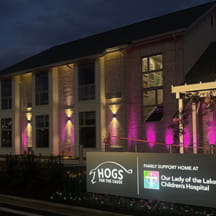When a premature baby was born at Clinch Memorial Hospital during a hurricane, nurses had to get creative.
The critical access hospital in southern Georgia lacked an infant warmer and needed to transport the baby to a hospital better equipped to provide care. But with no ambulance or helicopter available, nurses used small pieces of warmed blankets to regulate the infant’s temperature.
“We’re resourceful, but we don’t want to have to be,” said Angela Handley, the 25-bed hospital’s CEO. “We know there are just things we'll never do because that's not what we're designed to do. But we should be able to assess any pediatric emergency and confidently decide what to do next.”
Support for rural hospitals
In 2023, Clinch Memorial joined the inaugural cohort of Kids Alliance for Better Care (KidsABC), a program forged by an initiative between Children’s Healthcare of Atlanta, Mercer University School of Medicine, and the Georgia Rural Health Innovation Center.
Through the initiative, MUSM, and GRHIC provided Clinch Memorial infant warmers, an infant scale, vein finders, and other equipment that would have been financially unfeasible to purchase.
But the program’s goal is much broader. KidsABC seeks to help rural hospitals become “kid ready.”
Providers in rural emergency departments may have limited experience treating critically ill children. Nonetheless, sick and injured children will arrive in EDs in need of care, said Jean R. Sumner, MD, FACP, dean of the Mercer University School of Medicine.
“We worked with some guidance from experts at Children’s Healthcare of Atlanta to develop criteria and standards to train the nurses and staff and make sure these hospitals have equipment to resuscitate a child,” Sumner said.

Expanding participation
The first KidsABC cohort included eight hospitals and five pediatric practices; in its second year, the program added more rural hospitals, pediatricians, and family medicine offices. Along with pediatric-specific equipment from MUSM, each has received on-site training taught by staff from Children’s and telehealth connections, which allow rural doctors to bring a specialist to their ED to consult and examine a child.
“They have the ability to get a second opinion about a child or to ask questions to an expert about the best way to handle a case, which I think will make a huge difference,” Sumner said.
Cohort members also learn from each other. “What's fascinating to me is watching the interactions between these hospitals and how they are trying to help each other really improve their care for children,” she said.
“I can tell you that everywhere I go in these counties, I see a new excitement and a new spirit about the ability to provide care for kids. They don't do everything, but they can do things that will protect children and help them be healthier. And they're excited about it,” Sumner said.
A meaningful commitment
The 10-year commitment by MUSM and Children’s also seeks to increase the number of physicians in rural areas. Of Georgia’s 120 rural counties, 63 do not have a pediatrician.
Children’s is funding 10 full scholarships a year for medical students who commit to live and practice pediatrics in a rural county in Georgia and added scholarships for students pursuing master’s degrees in family therapy at MUSM. To date, 20 medical students and five therapists have accepted scholarships.
“Children’s serves kids from all 159 counties across the state, and we want to make sure that those kids — our kids — can get routine care in their communities,” said Marc Welsh, vice president of child advocacy and chief diversity officer for Children’s Healthcare of Atlanta.
Empowering communities
Along with ensuring children have access to care, Welsh said helping rural hospitals empowers local communities to find solutions that best serve their local populations.
“When we think about equity, it is about meeting the unique needs of the individual, meeting the unique needs of that community, and engaging them in that solution,” Welsh said. “We know our rural communities here in Georgia have a unique set of challenges, and the way we believe you best meet them is by engaging local folks in their own solutions, and not coming in and saying, ‘This is what you should do.’”
For Handley at Clinch Memorial, the support will help the hospital gain the community’s confidence.
“I do expect us to become more sophisticated in our practice. Now that it’s a focus, I’m sure we’ll identify other needs,” she said. “I think the long-term relationship with Mercer University and Children's in Atlanta will pay huge dividends to this community.”


